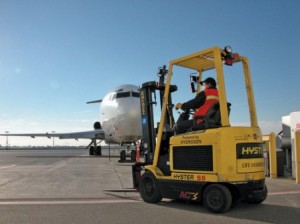Hydrogen powered fuel cell electric material handling equipment and other specialty vehicles/equipment are now commercially available and competitive with conventional equipment. These specialty vehicles include forklifts, material handling equipment, airport tugs, street sweepers, and wheel loaders. They are used by a variety of industries, including manufacturing, transportation/shipping, construction, agriculture, food sales, retailers, and wholesalers.
The benefits and market drivers of fuel cell powered materials handling equipment includes:
- Indoor and sensitive environment operation (such as food warehouses) with zero emissions;
- Lower annual cost of ownership, and nearly double the estimated product life of battery powered equipment;
- Full power operation for up to eight hours without loss of voltage before refueling;
- Fast refueling (2- 4 minutes) to allow 24/7 use with minimal downtime;
- Elimination of battery storage and charging rooms; and
- High efficiency and safety.
(see Commercialization of Fuel Cell Electric Material Handling Equipment)
Market Potential
Key market drivers of the global forklift truck market include:
- Expansion of warehouse space globally;
- Growing e-commerce business across the globe;
- Strong demand for forklift truck replacement in developed markets;
- Emphasis on reduced emissions in the working environment; and
- Purchase of low-cost forklift trucks in emerging markets.
Availability
Conventional and more traditional choices for material handling equipment include diesel, propane, and battery electric powered equipment. Battery electric powered equipment has been the technology of choice for indoor use where zero emission vehicles are required for health and safety. However, challenges with battery electric material handling equipment include: long recharging time that require vehicle isolation and downtime from fleet operation; depletion of charge in cold environments; voltage drops and reduction in power during use that results in slower operation; and the need to commit facility space for recharging and storage of heavy batteries to cycle into the fleet as needed. Overall, fuel cell electric material handling equipment can resolve these issues by carrying high energy density hydrogen onboard with conversion of the hydrogen to electric motive power through a high efficiency fuel cell.
Few, if any, commercial warehouses, manufacturers, or other service providers have the time or resources to experiment with new technologies in material management. A failure in material handling equipment can create significant delay to the core business that represents risk in production capability. Consequently, there is an expectation to use only tried and proven machinery. Consistent with market drivers and availability of advanced technology, the fuel cell electric material handling industry has deployed over 14,000 forklifts and other material handling equipment that have logged in more than 121 million hours of runtime with over 5 million fills to date. Users include Proctor and Gamble, Walmart, Kroger, BMW, Home Depot, and most recently, Amazon.
For more information, please access the materials presented during the “Fuel Cells for Forklifts” webinar (April 20, 2017)

